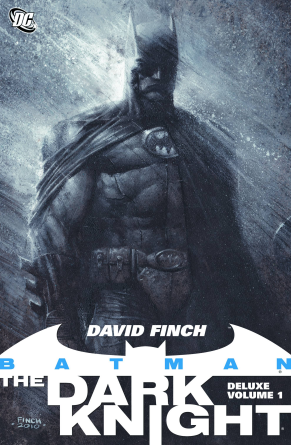By Jeremy Hannaford (Contributor) – Email
Print Edition: May 9, 2012
 With Bruce Wayne finally re-donning the cowl, David Finch creates a new tale about the original Dark Knight fighting crime in Gotham City in his new graphic novel Golden Dawn. The art style and visuals are detailed and crisp and adds a new edge to the lore of Batman. However, his artistic skills don’t help his storytelling as Golden Dawn is nowhere as eventful as it could have been.
With Bruce Wayne finally re-donning the cowl, David Finch creates a new tale about the original Dark Knight fighting crime in Gotham City in his new graphic novel Golden Dawn. The art style and visuals are detailed and crisp and adds a new edge to the lore of Batman. However, his artistic skills don’t help his storytelling as Golden Dawn is nowhere as eventful as it could have been.
Bruce Wayne has finally returned to present time Gotham after he was thought to have been killed by Darkseid in the Final Crisis finale. Instead, he was blasted back in time and had to slowly get himself back to the present. In his absence, Dick Grayson, aka Nightwing, took up his former mentor’s title and became the new Dark Knight. This spawned an interesting Batman & Robin series written by Grant Morrison featuring Bruce Wayne’s arrogant son Damian as the new Robin.
By bringing back the original man of night, writer David Finch is tasked with reconnecting us with Bruce and his dedication to being Batman and why he is ready to take back the position that Dick Grayson has been holding for some time. In this new adventure, socialite Dawn Golden has been kidnapped and no one has any leads on her whereabouts. Committed to a childhood memory of her, Bruce Wayne obsesses himself with finding her.
With all the hype that was surrounding David Finch’s entry into the Batman universe, people were expecting an intricate tale to work alongside with Grant Morrison’s Batman Incorporated story arc. However, Golden Dawn is flat and uninspiring. Problems litter the story from the sudden importance of an unknown character as well as the convenient inclusion of Jason Blood, aka The Demon Etrigan. Dawn Golden is introduced as a girl who, despite having never been heard of until this comic, has a special spot in Bruce Wayne’s childhood memory because she stole his kite and let it fly away. Unlike past female attachments to Bruce, she has no individuality and is just another scared woman in a small dress. Her presence is as bewildering as her father’s evil brotherhood of demon worshippers.
Rather than building a new story based on self-obsession and redemption, it is merely based on coincidence and moves on that until there is nothing left to do except change the comic’s story direction to something that actually matters. The dialogue and story-turn play out like an ’80s cop movie with numerous clichés and gimmicks. Bruce Wayne is supposed to try to convince himself and the world that he is still the Batman, but this aspect is overshadowed by this unimportant relationship between Dawn and himself.
If there are any positives to be found in this graphic novel, however, it is definitely the beautiful artwork – the characters and surrounding environment that David Finch and Jason Fabok pencil in engrossing detail. The color and quality of the prints are superb with clear illustrations of the actions and events that take place in the comic book. While the artwork does not hide the weak story, it definitely is a great book to look at.
Disappointingly, it is a mere 100 pages long. With a steep price tag of $30, the length is underwhelming. To give the illusion that it is a thicker copy, the novel features collections of stories from Grant Morrison and David Finch to help fill the pages. Another reason why the novel is so short is because the series is still ongoing, yet instead of waiting until the arc was complete, DC Comics put together what little had been made so far and packaged it together at a highly unfair price.
While it has incredibly engaging visuals and textures, Dark Knight: Golden Dawn is as bland as they come with plot-holes and clichéd situations. It is great to see a Canadian like David Finch get to work on the Batman Universe, but it looks as though he might have bit off more than he could chew by taking on both the role of writer and penciler.


